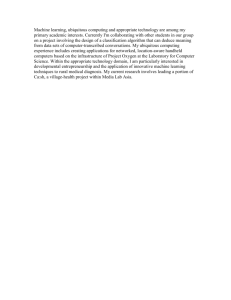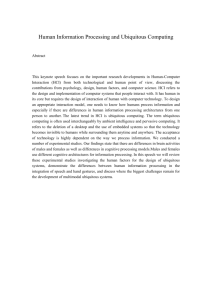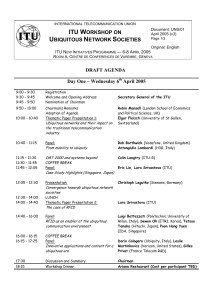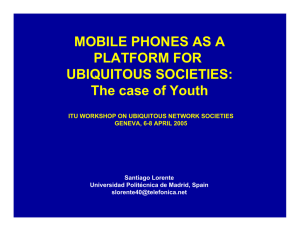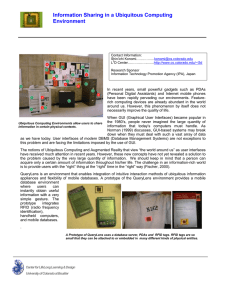W U N
advertisement
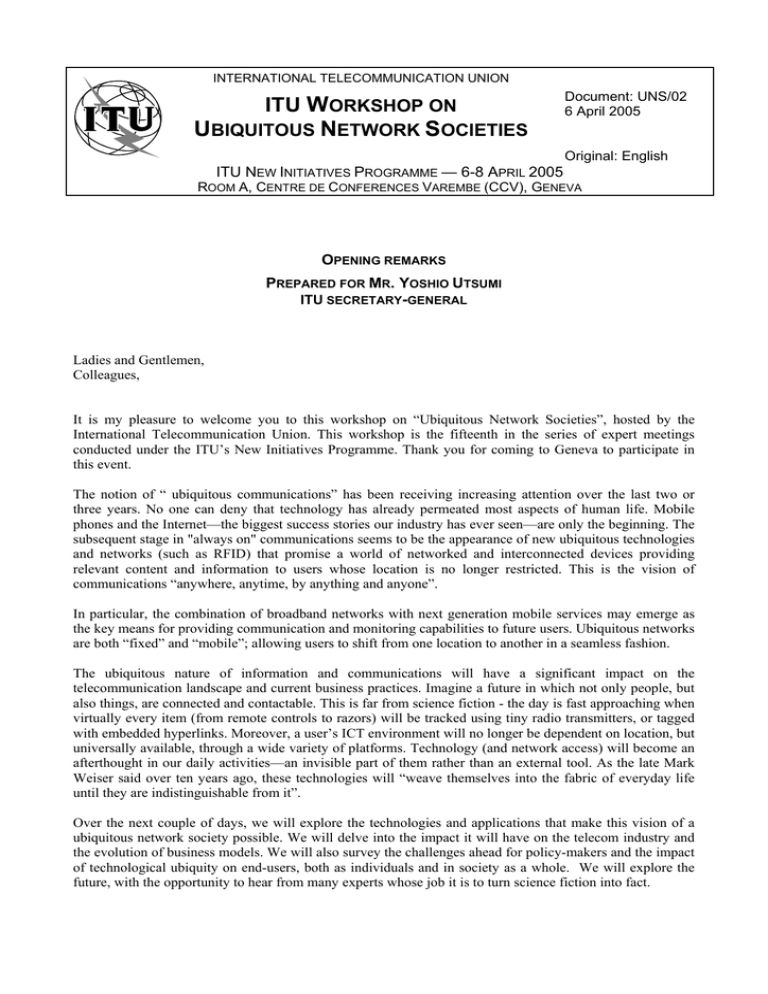
INTERNATIONAL TELECOMMUNICATION UNION ITU WORKSHOP ON Document: UNS/02 6 April 2005 UBIQUITOUS NETWORK SOCIETIES Original: English ITU NEW INITIATIVES PROGRAMME — 6-8 APRIL 2005 ROOM A, CENTRE DE CONFERENCES VAREMBE (CCV), GENEVA OPENING REMARKS PREPARED FOR MR. YOSHIO UTSUMI ITU SECRETARY-GENERAL Ladies and Gentlemen, Colleagues, It is my pleasure to welcome you to this workshop on “Ubiquitous Network Societies”, hosted by the International Telecommunication Union. This workshop is the fifteenth in the series of expert meetings conducted under the ITU’s New Initiatives Programme. Thank you for coming to Geneva to participate in this event. The notion of “ ubiquitous communications” has been receiving increasing attention over the last two or three years. No one can deny that technology has already permeated most aspects of human life. Mobile phones and the Internet—the biggest success stories our industry has ever seen—are only the beginning. The subsequent stage in "always on" communications seems to be the appearance of new ubiquitous technologies and networks (such as RFID) that promise a world of networked and interconnected devices providing relevant content and information to users whose location is no longer restricted. This is the vision of communications “anywhere, anytime, by anything and anyone”. In particular, the combination of broadband networks with next generation mobile services may emerge as the key means for providing communication and monitoring capabilities to future users. Ubiquitous networks are both “fixed” and “mobile”; allowing users to shift from one location to another in a seamless fashion. The ubiquitous nature of information and communications will have a significant impact on the telecommunication landscape and current business practices. Imagine a future in which not only people, but also things, are connected and contactable. This is far from science fiction - the day is fast approaching when virtually every item (from remote controls to razors) will be tracked using tiny radio transmitters, or tagged with embedded hyperlinks. Moreover, a user’s ICT environment will no longer be dependent on location, but universally available, through a wide variety of platforms. Technology (and network access) will become an afterthought in our daily activities—an invisible part of them rather than an external tool. As the late Mark Weiser said over ten years ago, these technologies will “weave themselves into the fabric of everyday life until they are indistinguishable from it”. Over the next couple of days, we will explore the technologies and applications that make this vision of a ubiquitous network society possible. We will delve into the impact it will have on the telecom industry and the evolution of business models. We will also survey the challenges ahead for policy-makers and the impact of technological ubiquity on end-users, both as individuals and in society as a whole. We will explore the future, with the opportunity to hear from many experts whose job it is to turn science fiction into fact. While it may be tempting to focus only on the wonders of the new technology, we must also acknowledge the need for consumer safeguards. It will be important to consider, for instance, how long service providers should retain information about users’ calls, messages and location. And while tiny radio tags may be helping retail businesses track inventory, it is crucial to discuss whether these will continue to be active after purchase and if so, what kind of information will be collected and how it will be distributed. The development of social norms is yet another sphere that demands attention. ICTs are meant to save us time and to promote and facilitate intercommunication. But we should ask ourselves whether social practices are developing hand-in-hand with technological development, and what policies may be required to discourage the growth of any undesirable side-effects, such as a loss of privacy, or a sense of technological alienation. It has often been argued that the beginning of a new technological development is the right time to consider its effects, social and otherwise. New technologies ought to be studied early in this context, both in national and international forums. *************************** To kick-off this workshop, and to inspire its discussions and deliberations, the ITU has prepared three background papers. These thematic papers cover the following topics: • • • The impact of ubiquitous ICTs on the traditional telecommunication industry, Privacy and Ubiquitous Network Societies, and Radio Frequency Identification (RFID). In addition, a detailed website on ubiquitous networked societies has been created as a resource for our membership. The website provides a portal to relevant information from around the world, including country-specific information on the key themes of this workshop. We have also researched and posted a series of case studies on Italy, Japan, Singapore and the Republic of Korea. I am sure that a detailed study of these documents will serve to inspire, direct and enliven your discussions. The main objective of the workshop is to serve as a forum for the exchange of information. To this end, it will draw from international experience in the field of ubiquitous communications and their impact on industry and society. Indeed, we look to participants to provide guidance as to how regulators, policy-makers, operators, technologists, journalists and individual citizens should respond to the challenges raised by the increasingly pervasive, ubiquitous nature of information and communication technologies. It is expected that, during the workshop, key areas for further international study and co-ordination will be identified. We hope to learn how we can, as a society, better adapt to our rapidly evolving technological environment, thereby leading to the development of the inclusive and people-centred information society of the future, as called for in the Geneva Declaration of Principles of the World Summit on the Information Society. This Workshop will also help to prepare for the WSIS Thematic Meeting “Towards the realization of a ubiquitous network society”, jointly organized by MIC Japan, ITU and United Nations University, to be held next month in Tokyo. I wish you a stimulating and fruitful discussion over these next couple of days on what bears the mark of a most challenging and fascinating topic. The success of this workshop depends on you, the participants. Please do remember that this is meant to be an informal gathering of experts. You have been invited here in an individual capacity, which should facilitate and encourage the free expression of your opinions. ********************** In order to help steer and guide our deliberations, we need a good chair – a particularly challenging role in this multi-disciplinary setting. I would thus like to nominate Professor Robin Mansell of the London School of Economics. Professor Robin Mansell holds the Dixons Chair in New Media and the Internet in the Department of Media and Communications at the London School of Economics and Political Science. Her research is concerned with the social, economic and policy issues arising from innovations in information and communication technologies. She is particularly interested in issues of governance of the new media and in measures to achieve improved coordination of policy institutions. Her most recent book is Trust and Crime in Information Societies (editor/contributor, Edward Elgar Publishers, 2005). I hope you will join me in welcoming Professor Mansell to chair the meeting.
